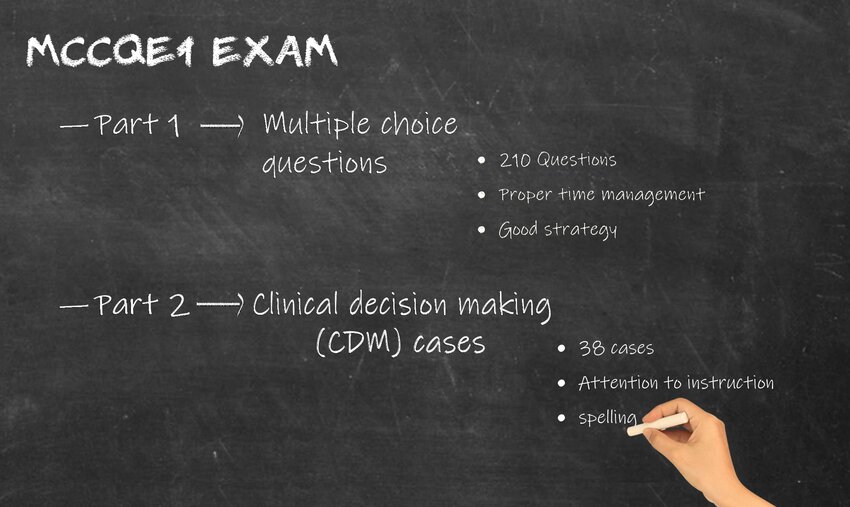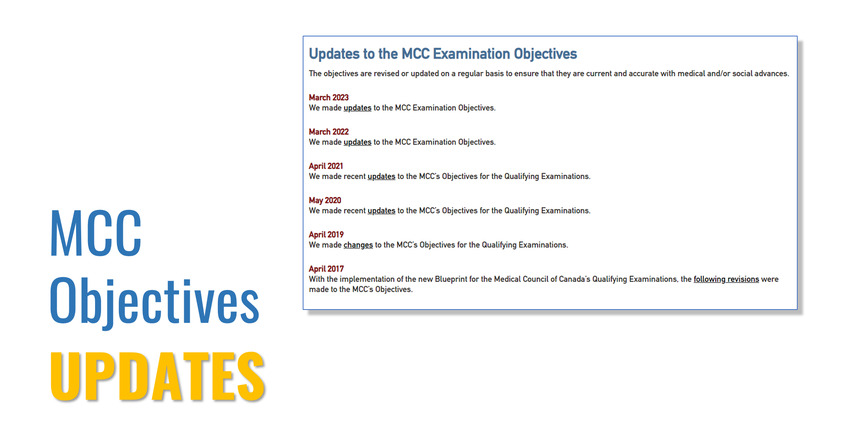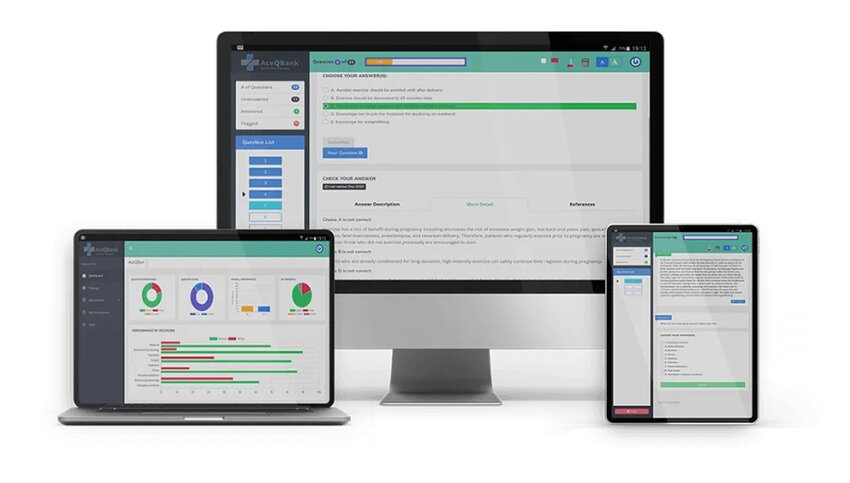How to Study for MCCQE1?

- Understanding the Format of MCCQE1
- Knowing the Medical Council of Canada (MCC) objectives
- Aligning Studies with Medical Council of Canada Objectives
- What are the Benefits of Ace QBank for MCCQE1?
- What Are Effective Strategies for MCCQE1 Exam Preparation?
- Tips for Answering MCCQE1 Questions
- Maintaining Motivation in the Run-up to MCCQE1
- Key Takeaways
Canada is renowned for its top-notch healthcare system, with exceptional medical professionals at its core. These professionals have successfully tackled the demanding Medical Council of Canada Qualifying Examination (MCCQE) Part 1, which is known for its difficulty. Canadian medical graduates consistently excel in this challenge, showcasing an impressive track record.
So, what is their secret to success? How do they navigate the complexities of medical knowledge and triumph in this rigorous exam? In this blog, we will explore the essence of the MCCQE Part 1. We will uncover the significance of the Medical Council of Canada (MCC) objectives and demystify their role in the preparation process.
We will also provide insights on aligning your studies with these objectives and offer effective strategies that have proven instrumental in achieving success. Furthermore, we will impart vital tips and techniques, garnered from years of experience and success stories, to bolster your confidence and enhance your chances of acing MCCQE1.
The road may seem steep, the challenge monumental, but with the right approach and unwavering dedication, success is well within your grasp.
Understanding the Format of MCCQE1
For anyone setting their sights on succeeding in the MCCQE Part 1 exam, understanding its format is not merely useful—it’s indispensable. The exam landscape can often feel like a labyrinth. Yet, in this maze of medical knowledge, it is the format–the blueprint of this exam–that provides a clear path to navigate. It’s this path that could potentially spell the difference between success and defeat.
Predominantly, the test divides into two major components:
- Clinical Decision Making (CDM) – CDM cases
- Medical knowledge – Multiple Choices Questions (MCQ)
Clinical Decision Making (CDM) and medical knowledge, a strategic approach designed to ensure a comprehensive understanding of quintessential medical concepts required by healthcare professionals.
The CDM section primarily assesses the candidate’s aptitude in diagnosing and managing both acute and chronic conditions. It presents the candidate with a clinical case, based on which they are expected to determine appropriate diagnostic procedures or proper management steps, adhering meticulously to the instructions provided. This section essentially serves as an avenue to refine clinical skills, from ordering tests and investigations to ensure accurate data acquisition, to proper management steps that minimize risk assessments.

How does the MCCQE1 scoring system work?
The scoring system is somewhat different in CDM cases from multiple-choice questions (MCQ), but both have no negative scores.
Negative marks are not given; you either get one point for being correct or zero if you’re not. Partial marks are also sometimes awarded when more than one answer is being scored (CDM cases). For MCQs, the rules are clear: select the correct answer and collect the score. If you answer wrong, you get nothing for it, or, in other words, you score zero. For CDM cases, however, the story is a little bit different. The score for a clinical case is divided between the total number of options. If you select two out of three, then you have collected a partial score for the clinical case.
But there are other situations where you might score zero on a question:
- Suppose you exceed the number of responses specified in the question. For instance, if there are two correct answers within the 10 provided options and you select three instead of two as the correct answers, you will score zero.
- You will also score zero if you select or list an item that could hurt or injure a patient. Even if your list contains the correct answer, including an option in your answer that could be harmful to the patient will result in a score of zero.

Knowing the Medical Council of Canada (MCC) objectives
The importance of understanding the MCC objectives cannot be underestimated. As the gatekeepers of medical licensure, the MCC has a critical role to play in ensuring that the health practitioners of tomorrow are well equipped with the knowledge and skills necessary to provide exemplary care for their patients.
However, one might argue that the understanding of these objectives does not directly translate into success or failure in the MCCQE Part I. Indeed, a number of candidates who have successfully navigated this rigorous examination on their second attempt have attested to this reality.
The objectives serve as a compass, guiding medical students and international medical graduates alike toward a comprehensive understanding of healthcare delivery. They are meticulously crafted and periodically updated to ensure relevance and alignment with the ever-evolving landscape of medicine.
And it’s not just about the updates introducing new objectives. The MCC also strives to continually enhance its existing objectives, reflecting a commitment to constant improvement and excellence. A recent update from the MCC serves as a testament to this, providing crucial information about enhancements made to the existing objectives.
Integrated within these objectives is the CanMEDS framework—a cutting edge model developed by the Royal College of Physicians and Surgeons of Canada, which has swiftly gained global recognition for its focus on multiple facets of medical training beyond just medical expertise. This framework serves as an essential pillar within the MCC’s objectives, further underlining their significance in shaping well-rounded, competent medical professionals.

So, while it may be true that knowing the list of MCC objectives does not guarantee a pass or fail outcome in the MCCQE1 exam, dismissing their importance could potentially mean missing out on a crucial part of medical education. After all, it is not just about passing an exam—it’s about becoming a competent and compassionate healthcare provider who can navigate the complex world of medicine with confidence and integrity. And in this journey, every tool and resource counts—including the objectives.
At this point, you’re probably curious to know more about the objectives. To find them, you can visit the official website of the MCC at www.mcc.ca. Once on their website, you can navigate to the “Examinations” or “Resources” section, where you are likely to find information about it. The website provides comprehensive resources for physicians and medical students, including information on licensure exams, practice resources, and educational materials.
However, there is a more efficient method. Allow me to provide you with guidance on how to easily find the objectives. Just follow my lead:
- First open your internet browser (any browser will do)
- Type in search engine – MCC objectives medical expert
- You should see the medical expert page now
- Click on medical expert then scroll down to see the objectives
The heart of these objectives beats with two primary goals. The first, a testament to academic excellence, gauges whether the candidate possesses the breadth and depth of medical knowledge needed to navigate Canada’s healthcare landscape. It’s not merely about retaining information; it’s about understanding, synthesizing and applying that knowledge in the crucible of patient care.
The second goal delves deeper. It’s a subterranean exploration of the candidate’s clinical decision-making abilities. Does the candidate have the acumen to make sound decisions about diagnosis and management procedures? Can they sift through layers of complexity to arrive at an accurate diagnosis? The answer to these questions is pivotal in establishing their readiness for the field.
Not only does the MCCQE1 examine a candidate’s ability to source medical data from a myriad of sources, but it also scrutinizes their capacity to provide safe and effective patient care amidst this information overload. It’s about making sense of chaos, about turning disorder into order.
In essence, the MCCQE1 objectives are not mere guidelines; they are the compass that directs the journey of aspiring physicians in Canada. They ensure that the physicians of tomorrow are not just competent, but also compassionate and capable – ready to uphold the highest standards of medical practice.

Aligning Studies with Medical Council of Canada Objectives
When it comes to the testing gauntlet of the MCCQE1 exam, mastery of the MCC objectives is the secret weapon. The most strategic approach is to immerse oneself in the practice questions of the Qbank with high yield questions crafted in harmony with MCC objectives and CanMEDS roles – a harmonious marriage of knowledge and application.
But, where does one find this tailored resource? Enter Ace QBank, a lighthouse in the stormy seas of MCCQE1 preparation. It holds the honour of being the only Canada Qbank for MCCQE1 that meticulously moulds each question and clinical case to align with the objectives. Ace QBank recognizes the weight of these objectives and ensures that every question encapsulates all necessary content.
With this exhaustive resource at their fingertips, medical graduates can boldly engage in practice and self-assessment, arming themselves with the knowledge and confidence to conquer the MCCQE1 exam. In the words of Churchill, they will be well-equipped to ‘keep buggering on’.
On the other hand, our team remains vigilantly attuned to the Medical Council of Canada, perpetually monitoring for any new updates or modifications in MCC objectives. As an intermediary, we ensure these updates are communicated efficiently and effectively to our dedicated physician team. Unfazed by challenges, our physicians strive relentlessly to translate these objectives into high quality questions, enhancing both the depth and breadth of Ace QBank.

The recent update of the Qbank with an additional 100+ questions stands as a testament to this unfaltering dedication. This update is not an isolated incident, rather it is a continuity of a series of improvements that have taken place over time, constantly refining and expanding the MCCQE1 Qbank.
In order to keep our esteemed users informed, we promptly announce the release of any new updates through our blog as well as various social platforms. For our premium members, we provide an added benefit. They receive a detailed breakdown of each update directly in their email inbox. This ensures they are always abreast with the latest advancements.
At Aec QBank, our mission is distinct and purposeful. Our endeavour is to meticulously craft questions and clinical cases, underpinned by the MCC objectives. We present self-assessments that mirror these objectives, ensuring our content remains relevant and robust.
Regular updates are part and parcel of our commitment, fostering alignment with the Medical Council of Canada. We strive to deliver nothing short of the most steadfast platform for MCCQE1 exam preparation.
The best part is that the question bank has been painstakingly designed, with every question and clinical case rooted in the objectives. It’s not just a resource for MCCQE1, it’s a comprehensive compendium that aligns seamlessly with the MCC objectives. This alignment is not mere coincidence but the result of a deliberate effort to provide a resource that directly correlates with the guidelines set by MCC.
And so, with this dedication to quality and alignment, we continue to strive towards perfection in our quest to provide the most reliable support for those preparing for their MCCQE1 exam.
By using the Qbank, medical students and professionals can practice and assess their knowledge and skills in a way that closely reflects the objectives they need to meet. This can help them identify areas of weakness and focus their study efforts on the specific topics and competencies outlined in the MCC objectives.

With an impressive array of over 2600 high yield questions and 144 top notch clinical cases, the Qbank spans a wide spectrum of medical disciplines. From internal medicine to surgery, pediatrics to obstetrics and gynecology, psychiatry and beyond, candidates are offered a comprehensive platform to prepare for the exam.
The Qbank goes a step further by providing detailed, evidence-based medicine explanations for each question and clinical case. This approach allows medical graduates to embrace their mistakes as stepping stones, reinforcing their understanding of the objectives. It’s not just about identifying gaps in knowledge, but also about charting a path for further study.
In the end, it’s resources like Ace QBank that serve as the bridge between aspiring medical professionals and the MCC objectives. These tools are expertly crafted to align with those objectives, providing an effective strategy that not only ensures alignment but also bolsters confidence. Harnessing such resources can make the difference between simply knowing and truly understanding.

What are the Benefits of Ace QBank for MCCQE1?
The best way to get ready for MCCQE Part 1 is to use a question bank. A question bank is a resource that contains thousands of practice questions that closely resemble the format of the actual exam. These questions come with detailed explanations, allowing you to become familiar with the types of questions you will encounter on test day. Additionally, the question bank helps you identify areas where you need further study.
Ace QBank has over 2600 high yield questions designed based on the MCC objectives with a comprehensive evidence-based medicine explanation for MCCQE Part 1, which provides an efficient way to prepare for the exam. However, there are several other benefits to using Ace QBank.
Realistic Exam Simulations, Detailed Explanations and References, Performance Tracking and Analytics, Summary tables and flow charts, Creating Questions from Incorrect Answers, and Summary Points are just a few of the many benefits offered by the Qbank.
Advantages of Ace QBank | |
MCCQE1 simulations | Provides realistic exam simulations mirroring the same difficulty, helping to familiarize users with the exam format to build confidence and foster effective exam strategies. |
Comprehensive explanations | In-depth explanations, evidence-based medicine for each question and concept breakdowns help to properly cover the MCC objectives. |
Summary tables | Visualize the condensed information in organized and easily understandable formats, facilitating efficient learning and retention. |
Flow Charts | Simplify complex concepts, and these visuals make it easier for users to understand key concepts, facilitating efficient learning and retention. |
Summary Points | Summary points for each question, highlighting vital concepts for quick review. This feature supports efficient revision and reinforces crucial exam knowledge. |
References | References to reputable sources are included, allowing further exploration of the topic and enhancing understanding of the medical concepts. |
Performance Analytics | Performance tracking and analytics allow users to monitor progress, identify strengths and weaknesses, and focus on areas needing improvement. |
Turning Mistakes into Questions | This adaptive learning approach eliminates weak areas by preventing repeating mistakes and reinforcing necessary practice for exam preparation. |
These features have transformed the way candidates prepare for the exam, making the learning process more efficient and effective. With realistic exam simulations, medical graduates can now experience the actual exam environment and get a better understanding of the format, time constraints, and types of questions they will encounter. This helps to reduce anxiety and build confidence.
Additionally, the detailed explanations and references provided alongside each question enable students to fully comprehend the concepts and principles behind the correct answers. Furthermore, the performance tracking and analytics tools allow students to monitor their progress over time, identify their strengths and weaknesses, and focus their efforts on areas that require improvement.
Summary tables and flow charts also contribute to a better understanding of complex topics by presenting the key information in a visual and concise manner. Another unique feature is the ability to create questions based on the incorrect answers given by the candidates, providing targeted practice and reinforcement for areas of weakness.
Another benefit of the Qbank is the inclusion of summary points at the end of each question, which helps to recap and consolidate understanding of the essential key points. Overall, these advanced features enhance the learning experience, boost retention, and ultimately lead to improved academic performance.
Finally, the self-assessments for MCCQE1 are a true simulation of the actual exam. Imagine taking your MCCQE1 exam but without the actual risks attached. That’s exactly what these Qbank self-assessments offer. They are not just a random collection of questions; instead, they provide a true simulation of what you’ll encounter in the actual exam.
Every assessment contains 120 meticulously chosen, high-yield questions, a separate entity from the question bank pool, and handpicked by medical experts. This meticulous process isn’t just for show, it’s to ensure that you’re truly prepared for the exam.
But here’s the silver lining. These assessments aren’t just about identifying what you know, they also pinpoint what you don’t. They act as a mirror, reflecting the areas you might have overlooked or need to revisit. This way, it’s not just about passing an exam; it becomes a journey of turning potential weaknesses into strengths before the final showdown.
This is not merely testing; it’s training. It’s not just about knowledge, but also strategy. It’s about moulding you into the best version of yourself before you step into that Prometric Centre.

What Are Effective Strategies for MCCQE1 Exam Preparation?
As we approach the exam day when your knowledge and understanding of the objectives will be put to the ultimate test, it is imperative to have a concrete strategy for preparation.
Preparing for such an examination is akin to embarking on a challenging expedition – without a map, you would undoubtedly lose your way amidst the labyrinth of complex medical concepts. However, with a well-planned strategy, you can navigate through this intricate maze and emerge victorious.
There are numerous strategies that could be discussed. These strategies, while important, are not the linchpin of success. They encompass an array of tactics from gaining familiarity with the exam format, to crafting a pragmatic study plan, to participating in study groups and engaging in mock examinations. Yet, there is one strategy, one game-changing stratagem, that is often overlooked, yet proven overwhelmingly effective.
This strategy is the cornerstone of comprehension of MCC objectives. It’s a secret, a key to unlocking the formidable door of the MCCQE1 examination. This strategy is not about memorizing vast amounts of information or mastering complex medical concepts. It’s about something far more fundamental and often elusive: time management.
Time, as we all know, waits for no one. It is the tide that never ceases and the clock that never stops ticking. And in the high-stakes environment of the MCCQE1 exam, time is the most precious resource one has. Properly managing your time during the exam is akin to a commander strategically moving his troops on a battlefield. This ultimately can be the deciding factor between success and failure.

Often taken lightly by many, the art of time management proves crucial in this high-stakes examination. The lack of it becomes a silent assassin, stealthily robbing candidates of valuable points. The consequence? A chilling scenario where candidates, in the final minutes of the exam, find themselves staring at a couple of dozen unanswered questions.
What makes this predicament particularly exasperating is that these unanswered questions turn out to be the simplest and most straightforward. A cruel twist of fate, rendering months of rigorous studying and preparation somewhat futile. Alas, the nature of the exam is such that one cannot predict the type or sequence of questions.
However, there’s a silver lining here. Mastering time management can be a game-changer. It’s akin to having an invisible shield, allowing candidates to navigate through all 210 questions systematically, without succumbing to the pressures of time.
The final submission of your exam should be a moment of triumph, not one tainted with regret over unanswered questions. Remember, time lost is opportunity lost. It’s high time we give time management the attention it deserves in the context of MCCQE1. After all, in this battle against the clock, every second counts.
In the grand theatre of examinations, time is the silent protagonist, omnipresent yet often overlooked. It’s a dance, a ballet where precision and discipline are the keys to a flawless performance. With these three elements – revision, clinical knowledge and prioritizing answering the question – one can master this dance.
Review medical concepts:
Consistency in revision helps time management a lot. When you first embark on this path, its benefits may not be immediately apparent.
As you progress and cover more objectives, you will realize the change. Suddenly, the dots start to connect. The recall of key points becomes faster and you will also see connections between the objectives.
In essence, consistency in revision does more than just aid time management; it fine-tunes your cognitive abilities, boosts recall and enhances retention. Therefore, the speed of analyzing the question stem and eliminating the wrong option becomes faster.
Focus on clinical knowledge:
The correlation between theoretical knowledge and real-life clinical scenarios cannot be overstated. A focus on clinical knowledge, particularly diagnosis, management, and treatment strategies for common medical conditions, is essential. The goal is not merely to amass information, but to understand the pathomechanism of disease.
Question bank summary tables and flow charts will help you navigate complex medical concepts. However, understanding the underlying pathomechanism is crucial here since mere memorization of summary tables and flow charts is not an effective approach and defeats the main purpose.
Focusing on clinical knowledge will help you to identify one clinical clue after another as you read the question stem. This will prevent re-reding questions and significantly boost the analyzing process of the questions, which will lead to better time management.
So far, we have discussed two elements that dramatically reduce the time of answering the question. But the third element has nothing to do with medical knowledge or clinical skills but it is vital.
Prioritize answering the question:
You should be able to understand the question, analyze and eliminate the wrong option or directly select the correct answer. After reading the question any wage sensation and feeling should translate to flagging the question and moving on.
There’s no denying that understanding the question is paramount. However, it is the control, the balance between obsession and discipline that defines your success. The intensity of your fixation can be a double-edged sword. It can either lead you to victory or lead to your downfall by disrupting your pace and timing.
Each question, much like every story, has its own time. A second glance or an overthought analysis in search for a hidden clue may cost you more than you realize – the entire examination. The perilous part about this element is its hidden nature – by the time candidates realize they’ve fallen into this trap, it’s often too late.
To counter this habit, one effective method is practising in a simulated exam environment using Qbank time mode. Here, you need to answer each question within the allotted time – no exceptions. Adhere to this rule and pace yourself. This practice will serve as an antidote to the habit of re-reading and over-analysing.
Break this habit before it breaks you. Before it shatters your dreams and aspirations. Use your time wisely, for poor time management is the silent killer in any examination.
So, as you prepare for your exams, remember that proper time management isn’t just a strategy – it’s your ally in success. Make sure you make it your closest friend, rather than your worst enemy. After all, the ticking clock waits for no one.

Tips for Answering MCCQE1 Questions
As a medical professional, you have already climbed mountains. Countless books, endless lectures, and invaluable patient interactions have sculpted your knowledge and skills. You’ve grown to distinguish the crucial from the trivial. And yet, time remains as elusive as ever. Now, with the Boards or a clerkship looming, your mission is to further explore the unknown terrains of your field, not to tread again familiar paths.
Yet, we often find ourselves ensnared in a counterproductive study cycle when it comes to Board exams. This cycle involves exhaustive reviews of entire subjects, without weighing whether we are only adding a marginal layer to our already substantial knowledge reservoir or whether we’re focusing on the right content for the upcoming examination.
Most likely, you have already weathered the storm of mastering medical concepts and tackled all MCC objectives. However, now you face a different beast altogether: acing MCCQE Part 1.
Preparing for the MCCQE1 is an unshakeable commitment on the path to becoming a physician in Canada. Understanding the exam’s format and question style and forming a formidable strategy to skillfully answer these questions are all vital elements that require serious consideration. The road to success is paved with these stones. Allow me to provide some advice on how to navigate this significant obstacle most effectively!
When it comes to the multiple-choice questions on the exam, they can be split into three main categories. The factual recall category includes threshold, indication, and contra-indication questions. These require a fundamental understanding of medical principles and can be considered the bedrock on which the other two categories rest.

Analytical thinking and clinical reasoning, on the other hand, demand a more profound comprehension. Requires the candidate to dig deep into their knowledge, extract pertinent information, and utilize it in a practical scenario. This is where the genuine difficulty exists. It’s not merely about memorizing facts; it’s about comprehending them to such an extent that you can logically deduce and navigate your way to the right answer.
In preparation for this test, it is imperative to cultivate skills across all three areas. A well-rounded competence is a necessity rather than a luxury. The ability to merely recite facts won’t suffice; there needs to be an ability to comprehend, analyze and reason. It’s a tall order, I concede, but one that is not beyond reach. It is a journey of intellectual growth, where one learns to transform rote knowledge into applicable knowledge.
It can be really helpful to have a few strategies practiced when you’re studying for your MCCQE1. One of the most fundamental, yet powerful, strategies at your disposal is the ‘process of elimination’. This tactic is as straightforward as it sounds, but its simplicity belies its effectiveness. It involves methodically crossing out options in a multiple-choice question that are patently incorrect.
Eliminating these false choices systematically, you work through the list until only one answer remains. It’s an elegant solution when faced with a bewildering array of choices, each seemingly as plausible as the next. However, even when armed with this technique, it’s possible to fall into the trap of overthinking.
Multiple-choice questions, by their nature, encourage doubt and second-guessing. It’s all too easy to become entangled in a web of hypotheticals and what-ifs, losing sight of the question at hand. This is where the value of trusting one’s instincts comes into play.
When you’re faced with a multiple-choice question and an answer immediately jumps out at you, it’s tempting to dismiss this initial intuition and delve deeper into the options. But often, this first instinct is the correct one. There is a certain wisdom in our immediate responses; they are a product of our accumulated knowledge and experience. Overthinking can sometimes lead us away from this truth. Thus, it’s prudent not to over-analyze ever.
Ultimately, the MCCQE1 is not just about clicking the box on a multiple-choice; it’s about applying logical reasoning to decipher complex medical scenarios. It’s about demonstrating your capacity to take theoretical concepts and apply them in a practical setting.

Maintaining Motivation in the Run-up to MCCQE1
As we approach the nerve-wracking phase of preparing for MCCQE1, I understand that many of you might be feeling a whirlwind of emotions. Stress, anxiety, excitement, and above all, the need to keep motivation levels high. So, let’s talk about just that – maintaining motivation during this critical time.
Foremost, it’s essential to remember that motivation isn’t something that’s constant. It fluctuates, and that’s perfectly normal. However, when it comes to a journey as vital as your MCCQE1 preparation, it’s crucial to keep that drive alive.
The first thing to do is to remind yourself of the ‘why’. What made you opt for a career in medicine? Was it a dream you’ve had since you were a child? Or Was there a decisive moment in your life that influenced this choice? Or maybe just the inherent wish to bring about change in the world? Whatever it is, cling to it. This ‘why’ is your anchor. It will ground you when times get tough and will serve as your North Star guiding you towards your goal.
Next, set clear, achievable goals. Remember Rome wasn’t built in a day – neither will your medical expertise be. Break down your extensive syllabus into smaller, manageable parts. Set daily or weekly targets. Celebrate your small victories – they lead to the big ones.
Furthermore, maintain a balanced lifestyle. Do not let your preparation consume you. Set aside time for recreational pursuits – delve into a book, enjoy a jog, or cherish moments with family and friends. A sound mind lives in a sound body, and maintaining equilibrium in your lifestyle will preserve your drive.
Lastly, surround yourself with positivity. Be it uplifting music or motivational quotes; positive reinforcement goes a long way. Find study groups or forums with like-minded individuals who are on the same journey as you. Sharing experiences and learning together will keep your spirits high.
Bear in mind, the journey to achievement isn’t straightforward. There will be obstacles and deviations along the way. But do not lose heart. Keep your eyes on the prize and continue to march forward with unswerving determination. In the words of Winston Churchill, “Success is not final, failure is not fatal: It is the courage to continue that counts.” So muster up that courage and forge ahead.
Maintaining motivation during your MCCQE1 preparation might seem like an uphill task, but remember, every step you take is one step closer to your dream. So keep going, and soon, you’ll find yourself at the top of that hill.
Key Takeaways
In the demanding and rigorous world of medicine, MCCQE Part 1 poses a formidable challenge that requires significant preparation. It’s crucial to delve deeply into the intricacies of MCC’s objectives, understanding not just what is expected but also how to navigate this complex matrix.
The journey to conquering the MCCQE Part 1 can be enhanced with strategic tools. Consider incorporating Ace QBank into your preparation arsenal. Designed with an eye for high yield questions, this resource turns the daunting task of exam preparation into a manageable one. The clinical cases it offers are meticulously crafted, adhering strictly to the MCC objectives.
Ace QBank is not merely a collection of questions – it’s an organized, methodical system with 21 distinct categories. You can customize question blocks in time or tutor mode, providing flexibility to suit your individual learning style. An exceptional feature such as hundreds of summary tables, flow charts and high-quality illustrations along with a reference section that aligns each question with its corresponding MCC objective, all to facilitate your preparation and boost your confidence.
The path to exam readiness doesn’t end there. MCCQE1 Self-assessments offer an accurate simulation of the MCCQE1, empowering you to identify areas requiring further attention. This powerful tool transforms potential weaknesses into strengths, ensuring you stride into the examination hall with confidence.
In the realm of board exams, victory favours those who are well-prepared and strategic. Giving yourself this extra edge could be instrumental in acing MCCQE1. However, I urge you not to simply take my word for it. Put these claims to the test, for it is only through rigorous scrutiny that truth shines forth. Try the Ace QBank free demo today!
Remember, effective exam preparation is a personalized process. Understand your strengths and weaknesses, adapt your study plan accordingly, and maintain a positive mindset. Stay focused, stay motivated, and trust in your abilities.
Good luck with your MCCQE1 exam!


